- Home
- Suzanne Selfors
Braver Page 6
Braver Read online
Page 6
Melvin hadn’t said a word, but he was sitting at the edge of his branch, paying close attention.
“Well, as I was saying, this monster took all the wombats away, on a paddle-wheel boat. Have you seen them? Do you know where they are?”
Bob wiped his mouth with the tip of his bald tail. Then he whispered something in Stanley’s ear. Stanley whispered something back. They nodded in agreement.
“Information is valuable,” Bob told Lola. “Do you have anything you could trade for information? Anything to eat?”
“Oh, yes, I do have some food,” Lola said hopefully. She set her pack onto the ground, then searched through it. “I have some roots, some bags of tea, and a tin of worms.” She held out the tin.
“Worms?” Bob grimaced. “We don’t need worms. The swamp is filled with them.”
“Oh.” Lola put the tin back and kept searching. “I have two bikkies.”
Stanley scurried forward and stuck his snout up to the biscuits, sniffing eagerly. Then he frowned. “They smell fresh.”
“No mold?” Bob asked.
“No mold,” Stanley confirmed. “No rot. No maggots.” He turned his back to Lola and shuffled to his branch. “No decent food, no information.”
“There must be at least something you can tell me. Why are rats helping a night monster? And where are they taking my family?”
Stanley and Bob ignored her. Stanley refilled his bowl and took a slurp. “Ouch,” he said. “This soup’s been on the fire too long. Just about burned my tongue.”
Lola looked down at her backpack. “Wait,” she said. “I think I have something you’ll like.” She pulled out the two wooden spoons. “You can have these. My dad carved them. If you use them with the soup, you won’t burn your tongue.” Despite the flickering flames, she edged closer, holding out the perfectly-hollowed spoons. “Could I trade these for information?”
Bob and Stanley eagerly snatched the spoons from her paws. After testing the spoons with loud slurps, the two of them agreed. So Lola asked her first question. “Have you seen my parents and the other wombats of the Northern Forest?”
“Nope,” Bob and Stanley said.
Lola gritted her teeth. “Okay, well, do you know where they might be?”
“Nope,” they said again.
Lola clenched her paws in frustration. “Well, what do you know?”
Bob scratched his back with his new spoon. “I know that a Tassie devil came here a few days ago. She promised us rats that we could eat all the food we wanted if we worked for her. Many of our friends left. We haven’t seen them since.”
“Did she have a gold tooth?” Lola asked.
Stanley pointed to one of his own teeth. “Gleamed like the sun.”
Lola’s paw clenched tighter as she pictured the critter who took her family away. “But why would rats work for her?” she asked. “Night monsters are dangerous.”
“It’s simple,” Bob said. “She offered them food. We rats think with our stomachs first, and our brains third.”
“What’s second?”
“Our tongues, of course!”
“Not all rats.” Melvin cleared his throat, then waved a paw to get Lola’s attention. “Not all rats think with their stomachs or tongues. I have made many decisions that are not food based.”
“That’s because you’re a weird one, you with your fancy bucket,” Bob said. “The rest of us care only about food.”
“If you care only about food, then why didn’t you go with the monster?” Lola asked.
Bob snorted. “Do we look stupid enough to work for a Tassie devil? Can’t keep eating good food if you get eaten, after all.” He tapped his foot, waiting for Lola to respond.
The popping of the embers, the crackling flame reaching for the starry sky, and the croak of a lone, insomniac bullfrog were the only sounds as Lola tried to figure out the answer to the question. “Um…” she paused, hoping she wouldn’t insult the only critters who’d had some real information for her. They didn’t look stupid. In fact, other than the green slime that clung to their fur, they had very nice faces, with little, round eyes and long, thick whiskers. But they had rejected a perfectly lovely oatmeal and acorn biscuit because it hadn’t been full of maggots or mold. “No?”
“You got that right,” Bob said. “Now, if you don’t have anything but those fresh bikkies, leave us in peace.” With their new spoons, he and Stanley began slurping the last dregs of soup.
Melvin slipped off his branch and walked over to Lola, his movements graceful and sleek, his tail held upright. He smelled surprisingly fresh and clean. He picked up one of the biscuits, turning it in his paws to examine it from all angles and sniffing curiously. “May I?” he asked Lola. She nodded. He nibbled delicately. His eyes grew wide as the sweet taste of acorns and oats filled his mouth. “It’s delicious. The hint of cinnamon contrasts beautifully with the honey. And the nutty texture of the acorns pairs well with the creamy oats.” He waved the biscuit at his companions. “You should give it a try.”
Bob and Stanley groaned. “You’re a disgrace to all swamp water rats,” Stanley said over his shoulder, his wormlike tail curling in on itself in apparent disgust.
Melvin smiled. “I do believe that’s the nicest thing you’ve ever said to me.”
This third rat was so different from the other two, Lola immediately sensed a kindred spirit. “You can have the bikkie,” she told him.
“Thank you.” He carefully clasped the biscuit in his paws as if it were a treasure. Then he ushered Lola to the edge of the dry land and they sat side by side on another fallen branch. The crackling of the fire and the voices of Bob and Stanley faded into the background. Melvin ate one biscuit while Lola ate the other. After each bite, he paused, as if thinking about what he was eating. Lola watched with fascination. She’d never seen anyone savor a biscuit in that manner.
“It’s rare that we get fresh food here in the swamp,” Melvin told her. “You see, it’s impossible to grow anything in these mucky conditions. And because the terrain is so difficult to cross, merchants don’t venture here. So for generations, swamp water rats learned to eat whatever they could find. As the years passed, taste buds changed and the rats who lived here got used to eating what others throw away. They began to prefer it.” He shrugged. “It’s nothing to be ashamed about. Scavenging is a noble profession.”
Lola nodded. “And useful, too.”
“Indeed. But it is not my calling. I am not like the others. My taste buds long for flavors that go beyond the palate of sour, putrid, and rancid. And these bikkies are divine. Do you make other delights?”
“I didn’t make them,” Lola said. “The only things I’ve ever made are bowls, but they always come out lopsided and wobbly. Wombats are supposed to be good at carving but … I’m terrible at it.”
“Seems we’re both a bit different,” he said. He smiled at her and she smiled back. Then he began grooming himself. His paws worked quickly, the sharp claws picking at crumbs and fluffing his fur. He removed the napkin from his neck and cleaned his face. Then he took a jar from his red bucket. It contained thick, green paste, a dab of which he rubbed into his paws.
“You won’t find a better paw cream on all of Tassie Island,” he explained. “It’s also good for itchy tails. It’s my own concoction, made from swamp mud and a few other secret ingredients. Want to give it a try?” He glanced at her slime-covered legs and raised an eyebrow. “You could use a bit of grooming.”
Lola knew her mother would be mortified by her messy appearance, but Lola didn’t care how messy she looked or how stinky she smelled. She needed to know things. Many things. And she needed to know them now. She politely dabbed some cream onto her palm, then asked, “Do you have any idea where the wombats might be?”
“I’m sorry, I don’t. But I do know something else.” He pulled a piece of paper from his bucket. “About an hour before you arrived, a pelican dropped this into the swamp.”
Lola jumped to her feet. “A me
ssenger pelican?” She couldn’t believe her luck. “Is the bird still here? I really need to talk to it. Where is it?”
“Gone, I’m afraid. You know how pelicans are. They do their jobs, hack down any fish in the area, then leave.” He held out the poster. Lola took it. The paper was so damp that the ink had run and splotched all the words.
“I can’t read this,” she said.
Melvin leaned forward and took a peek. “I’m afraid that’s what happens to paper in the swamp. It’s why I don’t own any books. They dissolve before you can finish reading them. You know, I don’t think I’ve ever gotten to the end of a story.” Lola thought about her beloved storybook and Rupert’s map. She didn’t want either to dissolve, and fidgeted uncomfortably.
“What did this say?” she asked, squinting her eyes at the blurry words.
“It was a job description. It said: ‘Attention all rats. Queen Myra needs you to join the new Royal Guard. Eat all the food you want in exchange for work. Come to Dore immediately.’”
“What’s the Royal Guard?” Lola wondered as a few drops of ink rolled down her arm.
“There used to be one, long ago,” Bob said loudly. He’d clearly been eavesdropping. “The Guard was formed to protect the royal family and the royal city, way back when the invaders came. But there’s been no need for a royal guard for generations.”
“Looks like they need one now. So that’s where we’re heading in the morning,” Stanley said. “To Dore, to offer our services to the queen. And we’ll get all the food we want without having to scavenge for it.” He and Bob slapped paws high in the air.
Melvin leaned close to Lola and lowered his voice. “I’m tagging along but I’m not going to join the Guard.”
“Then why are you going?” Lola asked.
“To seek my fortune.” He reached out and picked a strand of moss off Lola’s shoulder. “Living in a swamp is not for everyone, but it does have its merits. The climate keeps the skin moist and the claws supple. I intend to create an entire line of beauty products made from swamp mud. I’m going to open my own grooming salon.”
“Really?” Her eyes widened. “My uncle went to Dore to seek his fortune, too. And now he’s an ambassador.”
Perhaps it was the starlight, but it seemed to Lola that Melvin’s eyes lit up at that moment. “That’s quite a step up the social ladder. If a wombat can go that high, perhaps a mere rat can climb higher still. You’ve given me hope.”
“An ambassador?” Stanley jabbed his elbow into Bob’s side. “Can you believe that, Bob? A wombat working in government, a swamp water rat starting his own business, and a Tassie devil who’s left the mountain.”
Bob scratched his back, again, with his new spoon. “Everything’s changing.”
Lola frowned. One thing was never supposed to change. “It’s against the law for a devil to leave Mount Ossa. But I heard her say that Queen Myra had changed the law. That’s a lie. Queen Myra is good. My mum says she’s the best queen we’ve ever had. She would never let night monsters roam free.”
“Maybe she would, maybe she wouldn’t,” Bob said. He stuck another piece of wood on the fire. Then Bob pulled a blanket from his bucket. “Most critters in these parts are loyal to the queen. Me included. But the truth is, she’s never set foot up here, and none of us have taken the journey to meet her. She lives behind her golden walls, eating whatever she wants and doing as she pleases. It was her greatest grandfather who sent the devils away, long before any of us were born. Maybe that gold-toothed devil wasn’t lying. Maybe our little queenie did change the law, and maybe more of those monsters are coming this way.” He stretched out on the ground. “If more are coming, I’d rather be working behind those royal walls than sitting in the swamp, waiting for one to come cook me up for tea.”
“Me too,” Stanley said, grabbing his own blanket and stretching next to Bob. “I’m going to dream about royal garbage.” Then, after some good-nights, they pulled the blankets over their heads.
Lola had never heard anyone doubt the queen or her intentions. She thought about the portrait hanging in her burrow, and the same portrait hanging in the trading post. Queen Myra had the kindest, largest eyes Lola had ever seen. “Queen Myra would never do anything to hurt the Northern Forest critters,” she quietly said to Melvin.
“I hope you’re right,” Melvin whispered back. “But it is a mystery why she would suddenly want to form a royal guard.”
“My uncle will know the answer,” Lola said with the utmost confidence, “and find my family. I know he will.”
Melvin smiled at Lola, but it was a sad sort of smile, as if he didn’t quite believe her. Then he put his paw over his mouth and yawned. “It’s getting late.” Unlike the others, he didn’t lie on the bare ground. His blanket was sewn together, like a tube, and he slipped inside. “Good night.”
Lola looked around. “Are we safe from the bities?”
“The fire will keep them away.”
As much as the fire made her nervous, she was grateful for its presence. “May I walk with you? In the morning?” Lola asked. The rats would know the best way out of the swamp and it would be nice to have company.
“I don’t see why not. You shouldn’t be on your own.” He yawned again.
“Thank you,” Lola said, yawning as well.
Lola lay on the ground, her cloak spread over her. Except for Bob’s and Stanley’s muffled snoring, a heavy silence descended upon the swamp. No frogs, no buzzing insects, no trickling water. Silent but not peaceful, for Lola’s mind hummed with terrible thoughts. She pulled the cloak tighter, tucking it beneath her feet and sides, as if it were a shield. After closing her eyes she tried to channel her thoughts toward happy places—a mossy bed, a warm burrow, a family home. Stanley’s snoring became her father’s snoring. The lapping sound became the burrow’s stream.
Lapping sound?
Lola’s ear pricked and her eyes flew open. She took a shallow breath and held as still as a boulder. There it was again, the soft sound of water lapping against the shore. A wave? How could there be a wave in the swamp? Was something moving through the water?
The sound came again. Yes, something was out there, but none of the rats seemed to notice. Their hearing was clearly not as sensitive as hers. She held back a squeal as she imagined a night monster swimming slowly toward their camp. Minutes passed. Hours, it seemed. But the sound didn’t repeat. Holding herself in that frozen state was exhausting, and fatigue finally overcame her. Whatever was out there, it had passed by.
She closed her eyes, curled up, and fell asleep.
9
BABY BLUE
Lola spent the next morning following the rats through the swamp. Sometimes they waded, sometimes they walked on dry patches of land, but mostly they swam through the mucky, stagnant water. The rats were adept at swimming with buckets balanced on their heads and shovels secured to their backs, but Lola’s pack was not watertight, so she balanced it on her head. It wasn’t the most comfortable way to travel, but she didn’t care. Getting to the Royal Road as quickly as possible was her only concern.
Even though Lola was far larger than her companions, she had trouble keeping pace with them. The rats were smooth, sleek swimmers, able to dart beneath low-hanging branches while Lola had to swim around. They could slip over fallen trees faster than Lola’s short legs could manage. She spent most of her energy trying to keep up. But she did manage to squeeze in questions. “Why do you have shovels?”
“Best way to dig for rotting food,” Bob said. “Our claws aren’t like yours.”
Lola flexed her paw. Her five sharp claws and her padded palm were perfectly designed for digging and scooping. “I am particularly fond of my shovel,” Melvin said, reaching back and giving it a pat. This didn’t make much sense to Lola, for Melvin had expressed a dislike for garbage.
“Melvin doesn’t like to get his claws dirty,” Stanley explained, as if reading her mind.
Though the terrain was tricky, Lola was happy for t
he companionship. The rats didn’t mind conversation. And she quickly learned that they were fond of singing. Bob and Stanley sang a particular song so many times, Lola soon had it memorized and joined in.
When you dig in a garbage heap
Who knows what you shall find
Half a pie, a crust of bread, a slimy melon rind.
So raise your shovels to the sky
Then plunge them in the ground,
There’s garbage to be found, mates,
There’s garbage to be found.
If you feast in a garbage heap
You’ll be a lucky bloke
Wriggling maggots, putrid roots, a rotting artichoke.
So raise your shovels to the sky
Then plunge them in the ground,
There’s garbage to be found, mates,
There’s garbage to be found.
Finally, they emerged from the swamp. What a relief to be free of its sour scent. Lola took a deep breath of cool, crisp air, while Bob and Stanley coughed, apparently unhappy about the new, fresh scents. They’d met the southern fork of the Fairwater River. Just as Rupert had said, the swamp had proven to be a shortcut. Lola’s nose itched, she felt waterlogged, and she smelled bad, but she’d survived the bities and hadn’t seen any signs of more Tassie devils. All in all, she was in good shape.
This was no longer the Northern Forest. The landscape had opened up. Smaller trees were spaced wider apart. Tall grasses and shrubs were separated by stretches of dirt and exposed rock. The swamp’s thick foliage had filtered sunlight, but here the sun shone bright. Too bright. Lola found herself blinking more often and her eyes felt drier. Traveling in daylight was going to take some getting used to.
The river’s current flowed at a gentle pace. Melvin wasted no time and jumped into the water to scrub himself down. Hesitant at first, for this was not like the calm pools of the stream, Lola joined him, not so much because she wanted to remove the swamp slime, but because the cool waters were soothing in the heat of the day. The water lapped gently over her paws as she slowly settled down in the shallows, letting it run around her as if she were some great boulder in its path. After a while she rolled onto her back and stretched her legs out, the water caressing her back. She narrowed her eyes and scanned the sky. Still no sign of any pelicans. Bob and Stanley did not bathe, but did pause for a brief snack of rancid applesauce and larvae.

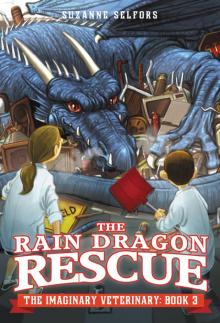 The Rain Dragon Rescue
The Rain Dragon Rescue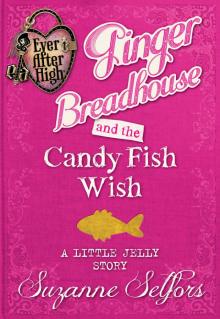 Ginger Breadhouse and the Candy Fish Wish
Ginger Breadhouse and the Candy Fish Wish Ever After High: Lizzie Hearts and the Hedgehog’s Hexcellent Adventure: A Little Shuffle Story
Ever After High: Lizzie Hearts and the Hedgehog’s Hexcellent Adventure: A Little Shuffle Story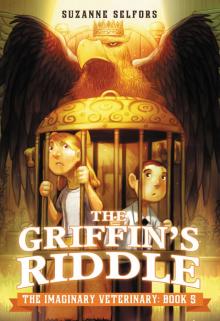 The Griffin's Riddle
The Griffin's Riddle Smells Like Pirates
Smells Like Pirates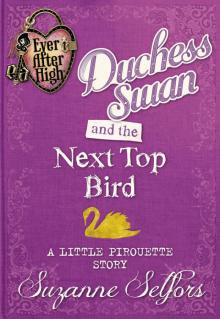 Duchess Swan and the Next Top Bird
Duchess Swan and the Next Top Bird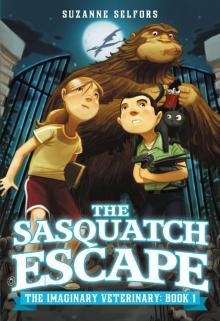 The Sasquatch Escape
The Sasquatch Escape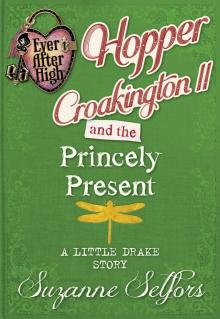 Hopper Croakington II and the Princely Present
Hopper Croakington II and the Princely Present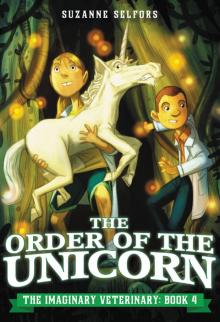 The Order of the Unicorn
The Order of the Unicorn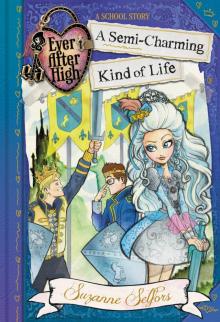 A Semi-Charming Kind of Life
A Semi-Charming Kind of Life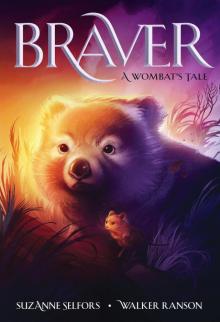 Braver
Braver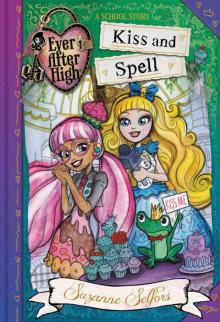 Kiss and Spell
Kiss and Spell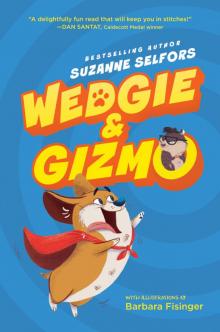 Wedgie & Gizmo
Wedgie & Gizmo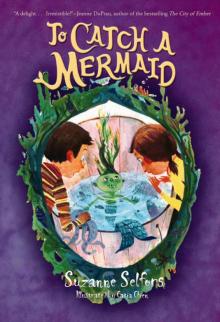 To Catch a Mermaid
To Catch a Mermaid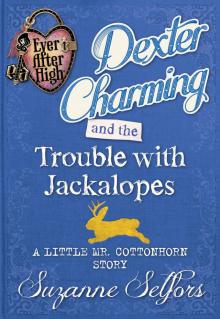 Dexter Charming and the Trouble with Jackalopes
Dexter Charming and the Trouble with Jackalopes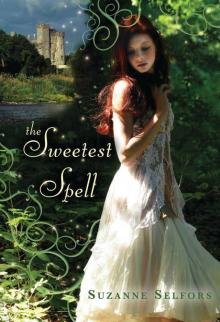 The Sweetest Spell
The Sweetest Spell CoffeeHouse Angel
CoffeeHouse Angel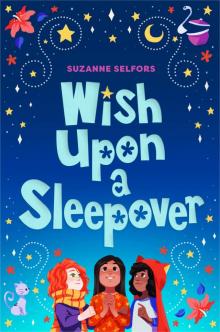 Wish Upon a Sleepover
Wish Upon a Sleepover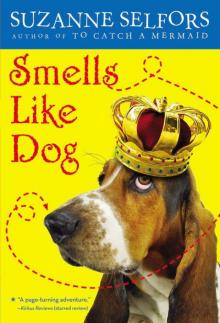 Smells Like Dog
Smells Like Dog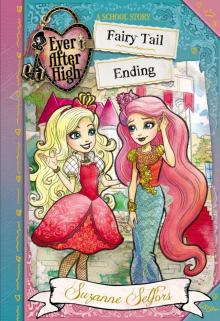 Ever After High
Ever After High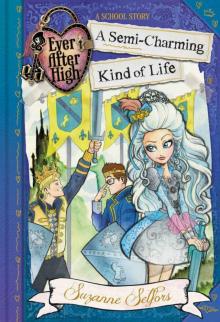 Ever After High: A Semi-Charming Kind of Life
Ever After High: A Semi-Charming Kind of Life Saving Juliet
Saving Juliet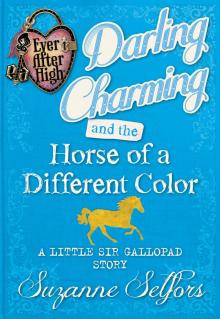 Darling Charming and the Horse of a Different Color
Darling Charming and the Horse of a Different Color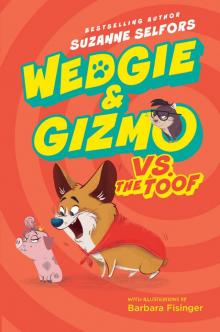 Wedgie & Gizmo vs. the Toof
Wedgie & Gizmo vs. the Toof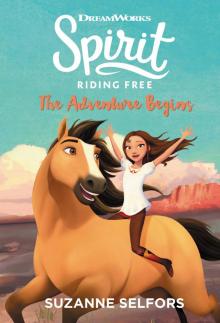 Spirit Riding Free--The Adventure Begins
Spirit Riding Free--The Adventure Begins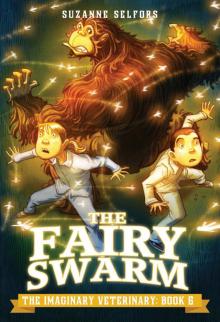 The Fairy Swarm
The Fairy Swarm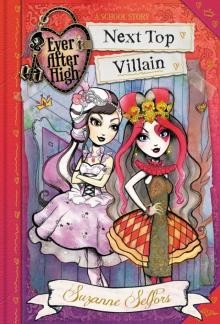 Ever After High: Next Top Villain: A School Story
Ever After High: Next Top Villain: A School Story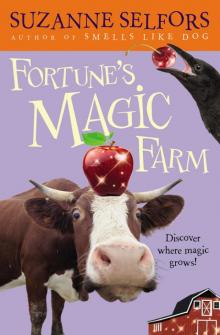 Fortune's Magic Farm
Fortune's Magic Farm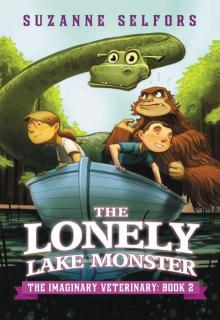 The Lonely Lake Monster
The Lonely Lake Monster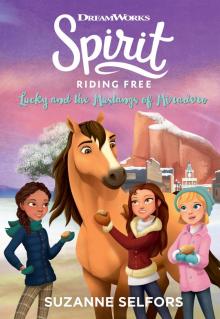 Spirit Riding Free--Lucky and the Mustangs of Miradero
Spirit Riding Free--Lucky and the Mustangs of Miradero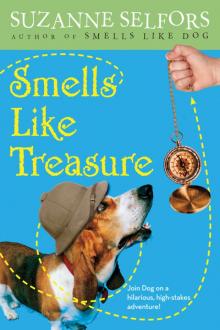 Smells Like Treasure
Smells Like Treasure Mad Love
Mad Love